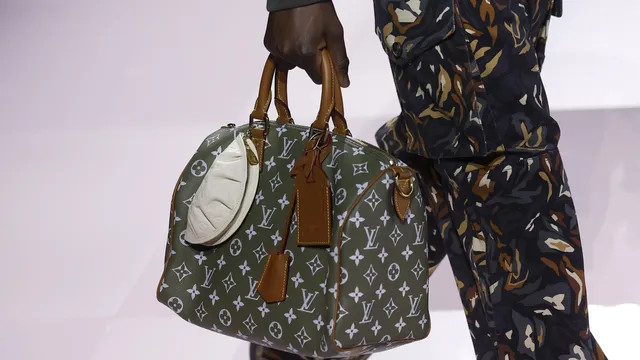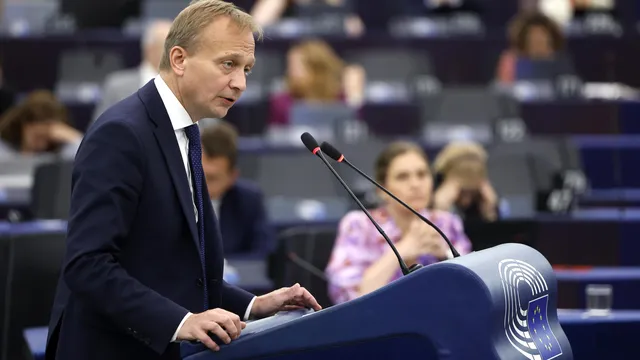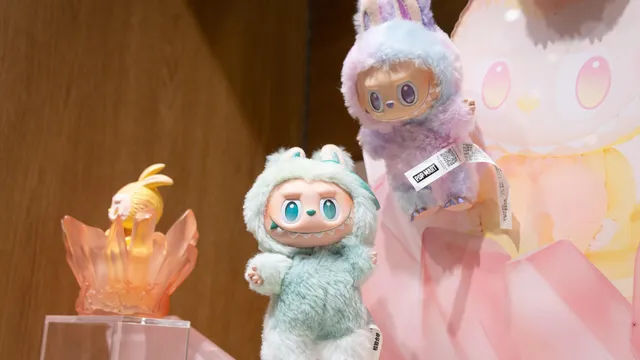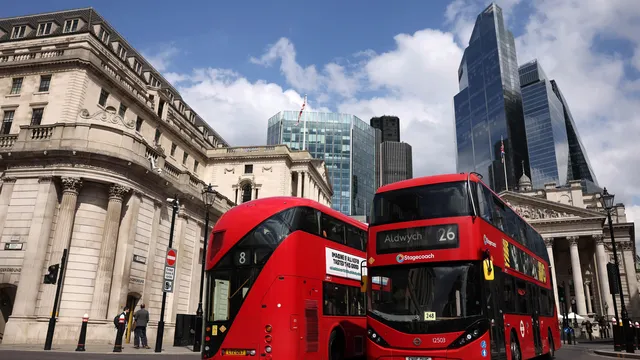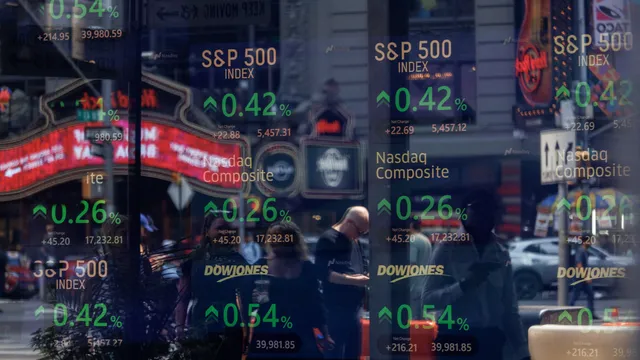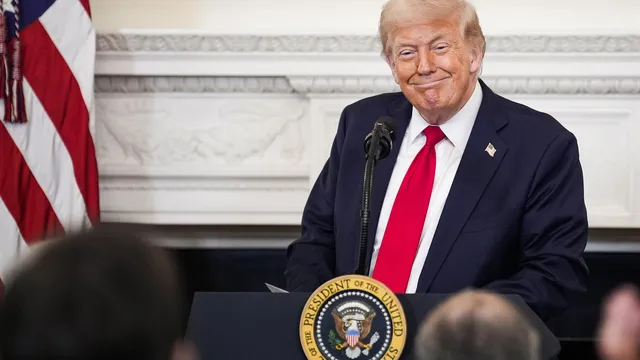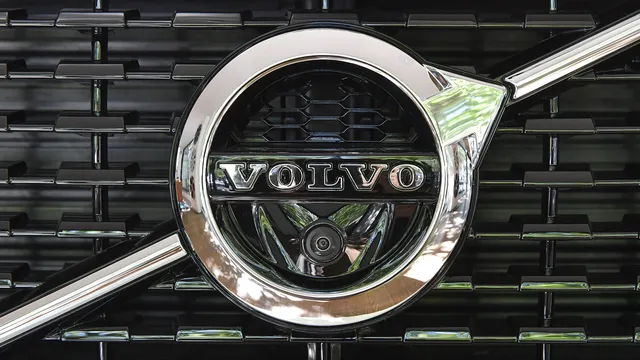Luxury European brands have long marketed expensive handbags based on the mystique of where they are made. Now the trade war (between the US and the EU) is testing the value of manufacturing in places like this sun-kissed city.
For years, workshops in Ubrique have produced leather goods for Chanel, Louis Vuitton and other brands, employing about a quarter of the town's 16,000 population. Along the road leading into town stands a giant statue of a patacabra, a wooden tool used to shape and smooth leather.
"We all basically live off leather here," says José Antonio Bautista, the town's deputy mayor.
US President Donald Trump's tariffs are now shaking the foundations of Ubrique's business model - and the wider luxury industry. On 23 May, Trump threatened a 50% duty on goods imported from the EU.
European brands have long created the perception that Old World heritage gives the continent unique opportunities to create goods for the world's most discerning customers, justifying their dizzying prices.
While high margins provide brands with some protection from tariffs, Trump's drive to move production to the US has prompted a new analysis of the 'Made in Europe' value proposition. The concern for some brands is this: luxury goods made in America will not have the same prestige among consumers.
"It would not make sense to me for Gucci's Italian bags to be produced in Texas," Francois-Henri Pinault, chief executive of the group that owns Gucci, Saint Laurent and Balenciaga, told French lawmakers earlier this month. "It doesn't make sense for my customers. I can't explain that."
The allure of European origins is already being questioned in the industry's second-largest market: China. After Trump announced his Emancipation Day tariffs, a wave of videos flooded TikTok that purported to reveal the true cost of luxury by showing how a number of high-end handbags - including the Hermès Birkin, which sells for over $10,000 - can be cheaply counterfeited in a Chinese factory.
The probe has drawn attention to places like Ubrique, where first-year trainees start on the equivalent of about $30 a day and the most experienced "production workers" are paid a daily wage of about $57, according to the local labor agreement. The agreement also includes a clause that obliges companies to increase wages if they are lower than Spain's minimum wage, calculated on a daily, monthly or annual basis - a provision that has become increasingly relevant as the country has repeatedly raised its minimum wage in recent years.
However, moving production to the US is easier said than done. In 2019, Louis Vuitton opened a leather goods workshop in Alvarado, Texas, as part of its drive to diversify production and meet growing demand in its largest market. But scaling up proved difficult.
The site has faced difficulties expanding as the company struggles to hire and train local artisans. CEO Bernard Arnault said he had planned to hire a thousand employees at the plant when it first opened, but years later it employs only about 300 people - a slower-than-expected expansion that the company partly attributes to the pandemic.
However, Arnault recently said the group "will inevitably be forced to increase its US production" if the EU fails to reach an agreement to avert Trump's tariffs.
A city built on skin
Spain is quietly playing a central role in the global supply chain for luxury goods - especially in the leather goods sector.
Nowhere is this more evident than in Ubrique, where leather craftsmanship boomed in the 19th century - aided by the city's abundant water supplies, which were crucial for softening the hides and dyeing them.
The isolation and poverty of the area also played its part. Families raised livestock, and women began sewing and finishing leather goods at home. By the 1970s, Ubrique had become a byword for artisanal production, attracting brands such as Dior and Loewe.
Today, bag makers rely on the city's extensive network of suppliers, specialist machinery, tanneries and logistics centres, which have developed together over decades.
Their proximity allows for speed and flexibility, which are crucial in an industry that is constantly working on new projects. Workshops often work side-by-side with brands to develop prototypes and refine products. Long-standing relationships strengthen trust and discretion, helping to protect sourcing strategies and unreleased designs.
Chanel's handbags are made in a discreet workshop with no signage, while Louis Vuitton relies on a longtime supplier with several sites in the city to produce items, including a $3,000 hobo-type bag.
Ubriquet's rich industrial ecosystem would be difficult to replicate elsewhere and would take years. Similar cohesive luxury clusters can be found in Tuscany for leather goods, in La Chaux-de-Fonds for Swiss watches and in the French city of Grasse for perfumes.
Economic forces have threatened Ubriquet before. During the 2008 financial crisis, many luxury brands moved production to lower-cost countries like China. The result was factory closures, job losses and economic pain.
"You can see people who have nothing to eat coming here and asking for help," says Bautista, the deputy mayor.
But just a few years later, the stamps are back. Factories in China are proving vulnerable to counterfeiters. When design or material data is leaked, copycat manufacturers can flood the market with fakes.
Inside the workshops
In many of Ubrieke's factories, workers arrive before dawn, stow their phones in lockers and wait for the 6.55am alarm. Once it sounds, they head to their benches and work - mostly on foot - until 3pm, interrupted only by a 20-minute break.
Luxury brands often promote the image of a single artisan painstakingly crafting a bag from start to finish. In reality, production is more industrial, divided into a series of repetitive, specialised tasks that require less training - in theory making it easier to move production elsewhere.
However, making luxury leather goods still involves a series of precise, practical steps that require a high level of skill. Leather must be inspected and cut, then thinned, reinforced, stitched and assembled - often with techniques that machines cannot easily replicate. The edges are finished by hand, and the hardware is carefully fitted.
The more experienced workers are assigned the most technically complex tasks. In one factory, employees say that men's backpacks are the most difficult to make - not only because of the number of components, but also because of the precision needed to fit the panels, handles and zippers.
"It's hard to find qualified people," says Manuel Fernandez, owner of the Don Puro workshop, which supplies several luxury brands. "For every three new employees, you can only keep one. The others just don't make it."
While businesspeople in Ubrique say they haven't yet felt the impact of Trump's tariffs, the uncertainty is leading to heightened concern in the city.
The widespread slowdown in luxury business has already affected manufacturers in the city. Although much of the slack has been absorbed by Polène, a fast-growing French brand that makes all of its bags in the city, some workshops are feeling the pain as customers cut back on orders.
Marcos Obando, who works for the local employers' association, hopes that big luxury brands will continue to invest in Ubrique even if tariffs increase costs. He argues that the city needs to bet on quality because it cannot compete on price - even with lower-cost neighbours like Portugal or countries in Eastern Europe.
"There's a reason all the brands have been working here for decades - why this city has been focused on this for many, many years," he says. | BGNES
-------------------
Nick Kostov, Wall Street Journal

 Breaking news
Breaking news
 Europe
Europe
 Bulgaria
Bulgaria
